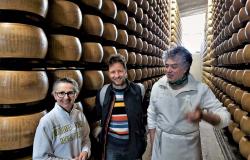[In the picture: Vincenzo Nibali, the Sicilian-born road bicycle racer, winner of the 2014 Tour de France.]
Sometimes, it seems that everyone in Italy is involved with sports of some kind, be it football (soccer), calcio, and swimming, nuoto, during the summer, and of course, skiing, sci, during the winter months.
In fact Italy is a perfect destination for sports enthusiasts as almost every town has a centro sportivo, sports centre, and the admission fees range from free to quite inexpensive. For example, the average price for a visit to an indoor swimming pool can be as little as €5 per day.
The Italian coastline has a wealth of safe havens for water sports, while the mountains are perfect for arrampicata, climbing, and winter sports including snowboarding (same word in Italian); national parks are ideal for anyone who enjoys hiking, escursionismo.
So here are a few phrases to help you with your sporting activities during your Italian holiday.
To ask someone what sport they enjoy, you simply ask, Che sport fai? Which translates literally as, what sport do you do? And the response you will get relies upon their chosen activity:
Il tennis – Tennis
Il pattinaggio - Skating
La vela – Sailing
L’equitazione – Horse riding
Il ciclismo – Cycling
Il tiro con l’arco – Archery
Depending upon which sport you participate in, there are three verbs that can be paired with it. For example, fare (to do or to practice) would be linked with the following:
Atletica – Athletics.
Palestra – Gym
Scherma – Fencing
Sci nautico – Water-skiing
So to say that you do athletics, you’d say faccio atletica.
Some sports require the use of the verb giocare (to play), these include:
Pallacanestro – Basketball
Pallavolo – Volleyball
And of course football, tennis and squash, so to say I play football you’d say, io gioco a calcio or to say we play tennis, you’d use the following conjugation, giochiamo a tennis.
You will at times need to use the verb andare (to go), for example andare a cavallo is used when you want to say to ride a horse.
As andare is an irregular verb, it’s useful to understand the conjugations which are listed below, it’s not necessary to use the personal pronouns in brackets unless stressing:
(io) vado - I go.
(tu) vai – you go.
(lui/lei) va – he/she goes.
(noi) andiamo – we go.
(voi) andate – you go (plural).
(loro) vanno – they go.
And finally here are a few phrases to help if you enjoy the sporting activities on offer:
Dove sono i campi da tennis? – Where are the tennis courts?
Qual è il prezzo per un’ora? – What’s the price per hour?
Posso noleggiare le racchette? - Can I rent racquets (rackets)?
Vorrei vedere una partita di calcio – I would like to see a football match (soccer game).
Mi può procurare un biglietto? – Can you get me a ticket?
Posso acquistare un biglietto? – Can I buy a ticket?
Dov’è la piscina? – Where is the swimming pool?
C’è un bagnino? – Is there a lifeguard?
Desidero noleggiare l’attrezzatura da sci – I want to hire skiing equipment.
Whatever activity you participate in, remember to stay safe and drink plenty of water during the Italian summer months.

















